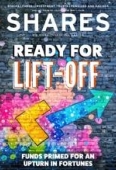Archived article
Please note that tax, investment, pension and ISA rules can change and the information and any views contained in this article may now be inaccurate.
From an employee share scheme at Rolls Royce to the Dogs of the FTSE – how Paul approaches the financial markets

Paul’s very first taste of investing came when his employer, aerospace and defence company Rolls Royce (RR.), introduced an employee share scheme which gave him what seemed to be a low-risk way of getting exposure to its shares.
It seemed low risk, explains Paul, because the scheme allowed employees to save a monthly or four weekly amount for five years and at the end of the period the savings and interest could be converted into Rolls’ shares at a fixed conversion rate or be cashed out.
Paul worked for Rolls Royce for almost 30 years and seldom found an opportunity to convert into shares because either the shares did not move much in the intervening period, or he had some other use for the money.
He also read somewhere that owning shares in the company you worked for could be risky. If the firm got into trouble, there was a chance you could lose your investment and job in one fell swoop.
GOING AGAINST THE GRAIN
Moving to more recent times Paul purchased some Rolls shares ahead of the company’s rights issue in 2020. Given the company was not paying dividends at the time, Paul admits this went against the grain of his investing style.
‘I am looking to increase the value of dividends received by my portfolio,’ explains Paul.
Nevertheless, he held onto the shares and eventually sold at a profit, acknowledging he could have held on longer to squeeze out an even bigger profit. However, the sale allowed him to reinvest the proceeds into a ‘dividend generating’ investment.
Having worked for the company for so long, Paul believes he has a good understanding of the how the business works. It is the long-term maintenance contracts which are the real money-spinner for Rolls, says Paul, as they earn income based on the number of hours the engines are in use.
And with pent-up demand after flights were grounded by the pandemic Paul reasoned that Rolls’ shares would be in demand thanks to the perception the company would benefit from an increase in hours flown.
Outside of work Paul dabbled in unit trusts but never really got to grips with how they worked, although he noticed the income focused ones tended to perform better.
Eventually he realised the products he invested in were quite concentrated (i.e. had only a small number of holdings) which explained why their prices moved around quite a bit as individual company results and news buffeted the value of the overall assets.
Later Paul decided to open a PEP (personal equity plan), a precurser to the ISA and take financial control of his investments. However, all these investments disappeared when Paul got married which he describes as ‘the best decision I ever made, although not financially’.
INVESTING AFTER A DIFFICULT PERIOD
The last decade has not been kind to Paul, he lost his wife in 2014, his father three years later and his mother in 2019. After this tumultuous period Paul started to invest again and set up a monthly investment plan.
He also consolidated his various pots and transferred them to a single provider, making it easier to monitor and manage. The two themes running through Paul’s holdings are diversification and a growing income.
The portfolio is invested across nearly 60 individual shares, eight investment trusts and five REITs (real estate income trusts). Taking account of the securities held by the trusts, the overall portfolio has exposure to close to 800 names, making it very diversified.
As well as income focused trusts such as City of London (CTY) the portfolio is invested in renewable energy plays like Bluefield Solar Income (BSIF) and Greencoat UK Wind (UKW), providing dividend yields of 8.6% and 7.7% respectively.
The portfolio has exposure to specialist sectors like biotechnology through its holding in International Biotechnology Trust (IBT) as well as property-related healthcare such as Impact Healthcare REIT (IHR) and US-based Omega Healthcare Investors (OHI).
The share selection includes perennial dividend payers like tobacco company Imperial Brands (IMB) with a 7% yield, and high yielding banks Lloyds (LLOY) and HSBC (HSBC).
DOGS OF THE FTSE
For one pot of money, Paul has started to invest in a ‘Dogs of the FTSE’ strategy after following how the strategy worked through a virtual portfolio while out of the markets.
‘I created spreadsheets and revalued them and although performance has been varied from year to year, and security to security, all the portfolios increased in value over the long-term, after adding in dividends,’ explains Paul.
Earlier in his investment journey Paul focused on higher dividend paying stocks but now he is experienced he has come to realise that a growing income might be more important than a high yield.
Paul does not obsess about performance on a day-to-day basis but prefers to see ‘blue’ on the screen rather than red when he does check in. A monthly investment plan means either topping-up existing holdings or investing in a new position which has potential to grow income.
This monitoring also includes weeding out shares which are not providing expected income growth. In terms of risk appetite, Paul tends to be drawn towards lower risk investments with a focus on quality dividend yielders.
He stays clear of growth investments, observing: ‘If the prospect is high growth, the risk is also big losses.’ He reckons his risk profile has not changed over time but his means of assessing risk has evolved.
Stocks are sold if the outlook for the dividend diminishes, or it has been cut or cancelled with no prospect of it returning in the near term. When investing new money Paul is always conscious of the benefits of diversification, which means investing in sectors not already represented in the portfolio.
There are times when an existing holding is swapped out for a better-quality dividend payer. Paul generates investment ideas by reading titles like Shares and The Daily Telegraph.
CONSIDERING USING STOP-LOSSES
For finding US stock ideas Paul reads publications such as The Dividend Hunter, Oxford Club, Zacks and Forbes magazine.
Paul does not use stop-losses to protect the portfolio from big losses but says he is beginning to think he should.
Since officially retiring and receiving the state pension Paul has started saving and investing more but laments it is getting harder to keep income and expenditures in balance.
DISCLAIMER: Please note, we do not provide financial advice in My Portfolio articles, and we are unable to comment on the suitability of the subject’s investments. Individuals who are unsure about the suitability of investments should consult a suitably qualified financial adviser. Past performance is not a guide to future performance and some investments need to be held for the long term. Tax treatment depends on your individual circumstances and rules may change. ISA and pension rules apply.
WE WANT TO HEAR FROM YOU
We are looking for individuals or couples to share their experiences of managing their own investment portfolios.
If you would like to take part, we want to know why you chose certain stocks, funds or bonds, why you might have subsequently sold some of them, and what you hope to achieve from investing.
We will pay £50 in John Lewis vouchers as a thank you to anyone whose story is published in the digital magazine.
Drop us a line with your name and two lines describing your investment experience. For those picked to feature in the magazine, we’ll be in touch to get the full story.
CONTACT: shareseditorial@ajbell.co.uk with the words My Portfolio in the subject line.
DISCLAIMER: Shares/AJ Bell does not provide advice or personal recommendations. The My Portfolio articles are for information only. You must do own research and consider your own personal circumstances before making investment decisions.
Important information:
These articles are provided by Shares magazine which is published by AJ Bell Media, a part of AJ Bell. Shares is not written by AJ Bell.
Shares is provided for your general information and use and is not a personal recommendation to invest. It is not intended to be relied upon by you in making or not making any investment decisions. The investments referred to in these articles will not be suitable for all investors. If in doubt please seek appropriate independent financial advice.
Investors acting on the information in these articles do so at their own risk and AJ Bell Media and its staff do not accept liability for losses suffered by investors as a result of their investment decisions.
Issue contents
Ask Rachel
Editor's View
Feature
Great Ideas
My Portfolio
News
- Bloomsbury shares touch all-time high as sales of fantasy novels soar
- Kooth shares plummet after US pilot trial terminated
- Lloyds Bank shares tumble 10% on motor commissions court ruling
- Tesla stock makes largest one-day jump since 2011
- Trainline issues second profit upgrade in two months
- Budget 2024: AIM rallies as infrastructure and hospitality firms toast measures
 magazine
magazine








